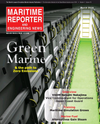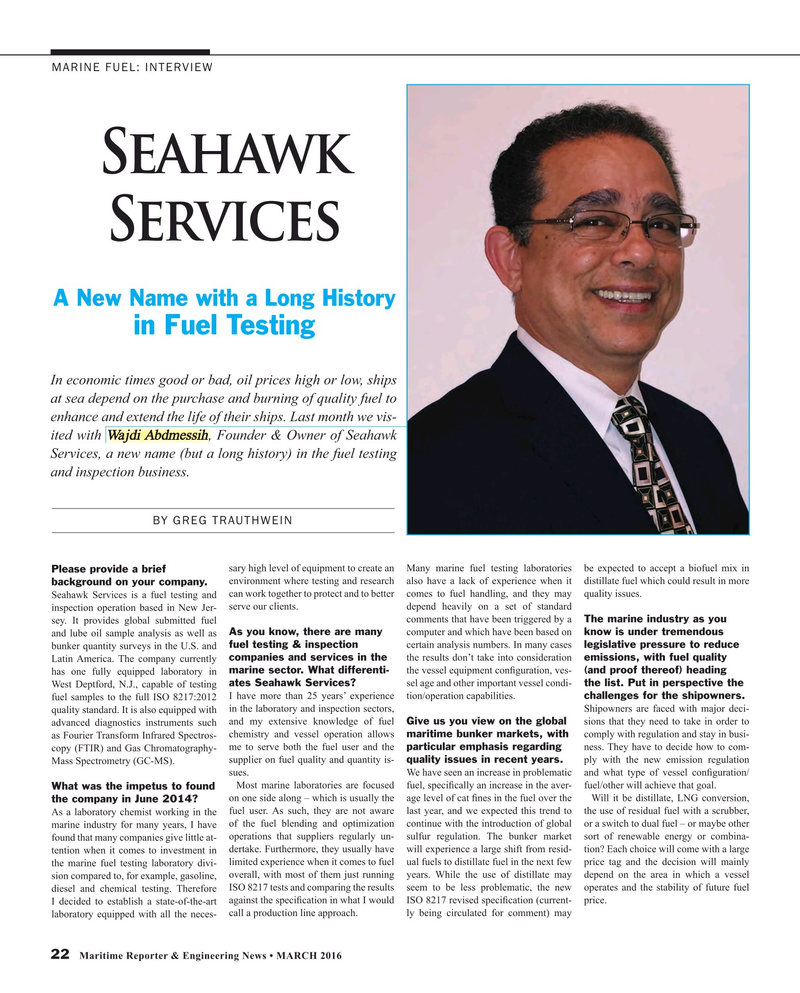
Page 22: of Maritime Reporter Magazine (March 2016)
Green Marine Technology
Read this page in Pdf, Flash or Html5 edition of March 2016 Maritime Reporter Magazine
MARINE FUEL: INTERVIEW
Seahawk
Services
A New Name with a Long History in Fuel Testing
In economic times good or bad, oil prices high or low, ships at sea depend on the purchase and burning of quality fuel to enhance and extend the life of their ships. Last month we vis- ited with Wajdi Abdmessih, Founder & Owner of Seahawk
Services, a new name (but a long history) in the fuel testing and inspection business.
BY GREG TRAUTHWEIN sary high level of equipment to create an Many marine fuel testing laboratories be expected to accept a biofuel mix in
Please provide a brief environment where testing and research also have a lack of experience when it distillate fuel which could result in more background on your company.
Seahawk Services is a fuel testing and can work together to protect and to better comes to fuel handling, and they may quality issues.
serve our clients. depend heavily on a set of standard inspection operation based in New Jer- comments that have been triggered by a The marine industry as you sey. It provides global submitted fuel and lube oil sample analysis as well as As you know, there are many computer and which have been based on know is under tremendous bunker quantity surveys in the U.S. and fuel testing & inspection certain analysis numbers. In many cases legislative pressure to reduce
Latin America. The company currently companies and services in the the results don’t take into consideration emissions, with fuel quality has one fully equipped laboratory in marine sector. What differenti- the vessel equipment con? guration, ves- (and proof thereof) heading
West Deptford, N.J., capable of testing ates Seahawk Services? sel age and other important vessel condi- the list. Put in perspective the fuel samples to the full ISO 8217:2012 I have more than 25 years’ experience tion/operation capabilities. challenges for the shipowners.
quality standard. It is also equipped with in the laboratory and inspection sectors, Shipowners are faced with major deci- advanced diagnostics instruments such and my extensive knowledge of fuel Give us you view on the global sions that they need to take in order to chemistry and vessel operation allows maritime bunker markets, with comply with regulation and stay in busi- as Fourier Transform Infrared Spectros- me to serve both the fuel user and the particular emphasis regarding ness. They have to decide how to com- copy (FTIR) and Gas Chromatography- supplier on fuel quality and quantity is- quality issues in recent years. ply with the new emission regulation
Mass Spectrometry (GC-MS).
sues. We have seen an increase in problematic and what type of vessel con? guration/
Most marine laboratories are focused fuel, speci? cally an increase in the aver- fuel/other will achieve that goal.
What was the impetus to found on one side along – which is usually the age level of cat ? nes in the fuel over the Will it be distillate, LNG conversion, the company in June 2014?
As a laboratory chemist working in the fuel user. As such, they are not aware last year, and we expected this trend to the use of residual fuel with a scrubber, marine industry for many years, I have of the fuel blending and optimization continue with the introduction of global or a switch to dual fuel – or maybe other operations that suppliers regularly un- sulfur regulation. The bunker market sort of renewable energy or combina- found that many companies give little at- tention when it comes to investment in dertake. Furthermore, they usually have will experience a large shift from resid- tion? Each choice will come with a large limited experience when it comes to fuel ual fuels to distillate fuel in the next few price tag and the decision will mainly the marine fuel testing laboratory divi- sion compared to, for example, gasoline, overall, with most of them just running years. While the use of distillate may depend on the area in which a vessel diesel and chemical testing. Therefore ISO 8217 tests and comparing the results seem to be less problematic, the new operates and the stability of future fuel
I decided to establish a state-of-the-art against the speci? cation in what I would ISO 8217 revised speci? cation (current- price.
call a production line approach. ly being circulated for comment) may laboratory equipped with all the neces- 22 Maritime Reporter & Engineering News • MARCH 2016
MR #3 (18-25).indd 22 3/2/2016 9:58:04 AM

 21
21

 23
23
